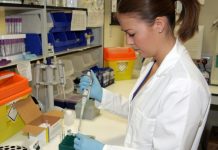Research nurses work to support the practice of nursing by improving the quality of care given to patients in clinical, palliative and home settings. An evidence-based area of practice that often partners with other disciplines, nurse researchers are important for expanding knowledge and care. Because they are nurses first, research nurses takes their cues and concerns from patients.
From conducting research that aims to improve symptoms to expanding options within palliative and end-of-life care, nurses who have earned their doctorates and other certifications and training for research are uniquely patient care–centered. Unlike doctors, who seek to manage and defeat disease, a nurse’s goal is to make patients as comfortable as possible.
Their emphasis, funding, research projects, orientation and approach to research is unlike other areas of research in medicine. Here is a look at what nurse researchers do in order to improve patient quality of life and care in the healthcare system.
Nurse Researchers’ Aims
Nursing research has expanded knowledge and practice regarding patient care, health and disease. In the scope of this research, four emphases have been identified and continue to be expanded upon:
Symptom science
This area focuses on how different diseases, treatments, medicines and protocol affect patients.
Wellness
This area of research works to prevent illness and disability and promote health.
Self-management
This emphasis aims to understand, manage, reduce and eliminate the symptoms caused by different illnesses.
Palliative care
In this sphere, nurse researchers work to ease end-of-life suffering and promote better palliative care and practice.
Nurse researchers conduct investigatory research in one of these four arenas, and they do so according to very specific standards and practice.
Protocol Development
Any research project begins with a protocol development where a research team attempts to determine how the research will be measured; what data will need to be gathered; what tests will need to be administeredin order to gather data; whether blood tests will be a part of the study; whether the tests can be conducted during routine visits by patients to the hospital or if extra visits will be required—the list is extensive.
One way nurse researchers are especially valuable in protocol development is in their understanding of patients. Nurse researchers, because they are on the front lines of patient care, are essential in many research projects simply because they will help develop a protocol that balances the needs of patients with the needs of the research.
Informed Consent
After protocol development, a Patient Information Sheet, or PIS, and consent form must be drawn up. A PIS contains information a potential study participant must legally be made aware of.
Research nurses are often responsible for drafting the PIS because they understand the specifics of the research, the requirements of the law and what potential study participants will need to understand. Research nurses are able to effectively communicate the research team’s complex goals and methods to study participants in ways that can be more easily understood.
Patient Recruitment
Oftentimes, patient recruitment is the responsibility of a research nurse. Because they understand care pathways so well, a nurse is able to identify potential patients more easily.
Through screening hospital notes, attending multi-disciplinary team meetings and networking with other researchers and teams, nurse researchers are able to identify potential study participants in a suitable fashion that can benefit researchers and study participants.
Data Collection and Safety Reporting
A research nurse is often responsible for ensuring that the patients recruited to participate in a study follow through with all necessary aspects of the protocol—an important job that allows for all essential data to be collected.
In addition to ensuring proper and complete data collection, nurse researchers also attend to what is called “Safety Reporting,” where all the adverse and negative reactions to a treatment, protocol or medicine are also recorded. Researchers must always attend to the balance of a method of care and its side effects. Within the realm of data reporting, keeping track of untoward effects is essential.
Research nurses have a unique role to play in medical research. Because they understand patient culture so well, they are often essential in drafting and conducting studies that people are willing to undergo. Always concerned with the patient, nurse researchers continue their mission even when they’re in the laboratory.
Photo Credit By: id-ea.org













